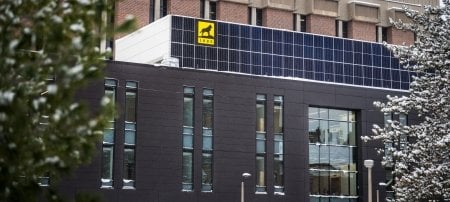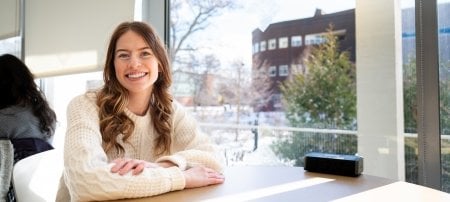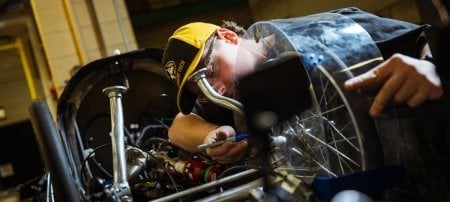A new semester is underway, bringing with it new opportunities and new energy. Here are a few fresh ideas from the past month.
If the campus' working M.O. is "create the future," then our students and faculty are living it this fall. From climate change to analytical chemistry to business pitches, Michigan Tech folks push the cutting edge.
They're also smart enough to try and avoid the bleeding edge—this is a community of practical people with vision. The following snippets are updates from projects that balance pie-in-the-sky goals (you know, solving global warming and streamlining interdisciplinary research) with a common sense approach. Conveniently, the attitude also helps deal with the shorter autumn days and pending snowfall.
Rethink Climate Change
Gina McCarthy, head of the Environmental Protection Agency, says a solution to the pressing challenges of climate change is hidden away in high schools and colleges. It's students, she says, and she called on four Michigan Tech undergraduates from civil and environmental engineering to talk about it.
The students were part of an international teleconference comprised of several schools and institutions from across North America. Emily Shaw, Huiling Piao, Emily Oppliger and Alexandra Bergquist not only attended, they were asked to prepare questions for McCarthy, along with her Mexican and Canadian counterparts. Guided by Alex Mayer, the Charles and Patricia Nelson Presidential Professor in civil and environmental engineering, the four young women examined McCarthy’s vision for the future. Specifically, they wanted to know the plan for including more women and minority groups in climate change discussions.
“Earlier you [McCarthy] mentioned the importance of paid internships and using that as an opportunity to decrease barriers to entry of youths in public service,” Shaw said. “What is your plan for the other barriers that exist for minority students, such as active recruitment and work permits?”
McCarthy answers with what she calls the “nudge” approach. Programs focusing on integrating more women and minorities into government jobs, helping them gain experience in the field, giving them the expertise and combat skills to continue the fight against climate change. McCarthy believes this will not only give younger students a powerful assault against global warming, but also the teeth to begin their own careers in the field.
McCarthy also made a point about personal change—a kind of "sacrifice"—and compared it to trying to lead a healthier lifestyle.
"If you tell someone to take medicine to get better, they won’t take it. Tell them it’s candy and they will eat it up," McCarthy said. She called on the students attending to figure out what inspires them—what gives them an intellectual sugar rush—that could be harnessed for the greater good.
Accurate Royalty
Michigan Tech's new mass spectrometer is like a technical version of the Princess and the Pea. The analytical chemistry machine can detect tiny changes in complex environmental samples.
Lynn Mazzoleni, an associate professor of chemistry, manages the instrument and lab (dubbed ChARM for Chemical Advanced Resolution Methods.) ChARM is hosted at the Great Lakes Research Center within the Microanalytical Facility. Mazzoleni says getting structural and quantitative data is challenging for trace components in samples like nutrients in infant tears or dissolved gases in peatland pore water. Quantitative measurements for such delicate and small molecules require both advanced chromatography—the separation and analysis of mixtures—as well as minuscule mass measurements in femtograms (0.000000000000001 grams).
“We absolutely need ultrahigh resolving power to see the molecules in extremely complex mixtures in order to learn more about various natural systems, including aquatic systems, terrestrial systems, biological systems and atmospheric aerosols,” Mazzoleni says.
Environmental samples are challenging to analyze in other universities' facilities that focus on larger molecules in health-related biochemical samples. Being able to handle a broader range of samples opens doors across disciplines.
“This project is a model of the deeply interdisciplinary collaboration that not only characterizes the nature of contemporary science, but which also marks many of the most exciting research activities now underway at Michigan Tech,” says Bruce Seely, dean of the College of Sciences and Arts, adding that Mazzoleni’s efforts to obtain the equipment span more than three years. “This is also a great example of how persistence and determination in the pursuit of external support can pay off for the researchers and the campus at large. I congratulate her and the team for their efforts.”
More Money, More Ideas
Crazy and smart—the Annual Bob Mark Elevator Pitch Competition is coming up. The contest at 7 p.m. Thursday, Oct. 6 at the Rozsa Center is like an elevator ride with a potential investor. Contestants get 120 seconds to cold-sell their concepts with $6,500 in prize money at stake.
A panel of judges decides who gets the money and associated opportunities to bring the winning ideas to life and jumpstart new businesses. There is also a prize for the audience favorite, the candidate who most appeals to the crowd.
The competition is named for the late Bob Mark, a professor of practice in the School of Business and Economics, who died in 2011. He brought the Elevator Pitch to the SBE, and was the driving force in the competition’s first four years. He also brought the Business Plan Competition to the University. Known as “The Original Pitcher,” Mark thrived on inspiring and advising the contestants. He was a firm believer that entrepreneurs, startups and established businesses should avoid the “we have no competition” mindset, because it limits performance.
Mark's other gems of business acumen include expressing numbers that are a rough guess in threes, sevens or nines to make them sound more realistic. And he always asked his students to memorize the first and last statements of their pitches, letting everything in the middle flow naturally. That way the pitches feel more authentic and sound genuine.
Confidence is the most important requirement, Mark said, recommending pitchers avoid "maybes" and other less definite phrases. Last but not least, because the competition has an audience favorite prize, he advised participants to invite friends to the event.
More details on the schedule of events are available on the website.
Michigan Technological University is a public research university founded in 1885 in Houghton, Michigan, and is home to more than 7,000 students from 55 countries around the world. Consistently ranked among the best universities in the country for return on investment, Michigan’s flagship technological university offers more than 120 undergraduate and graduate degree programs in science and technology, engineering, computing, forestry, business and economics, health professions, humanities, mathematics, social sciences, and the arts. The rural campus is situated just miles from Lake Superior in Michigan's Upper Peninsula, offering year-round opportunities for outdoor adventure.






Comments